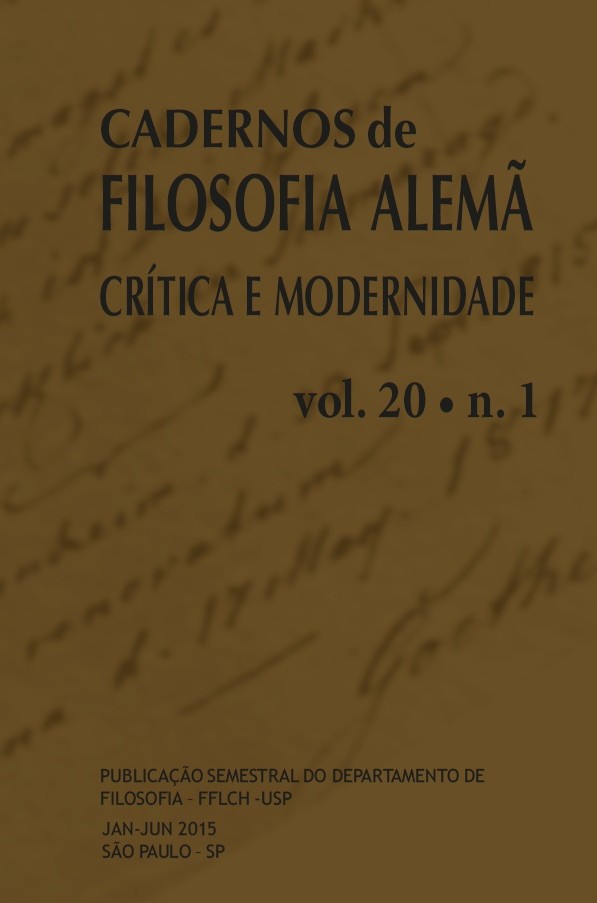Duty, justice and coercion in Kant’s juridical cosmopolitanism
DOI:
https://doi.org/10.11606/issn.2318-9800.v20i1p75-90Keywords:
cosmopolitanism, republicanism, society, civil union, Kant, Sieyès, GentzAbstract
The article aims at giving an account of the coercive weakness of Kant’s cosmopolitan right and at understanding the mechanisms proposed to spread the republican forma regiminis throughout the earth. With this goal, I will analyze the Kantian model of the transition from the state of nature, t.i. a social state, to the civil union as a step that brings human beings from the empirical to the intelligible realm. I will attempt to gauge the distance between right as a product based on reason and right as a political instrument intended to reduce the effects of social inequality. The paper discusses the relationship between theory and practice regarding the scope of right, concluding that Kant always gives priority to the first over the second, what encourages considering the idea of a cosmopolitan federation States as a consequence of the mere existence of a true single republic on the earth.Downloads
References
DOTTI, J. Observaciones sobre Kant y el Liberalismo. Araucaria, 13 (2005).
DUQUE, F. ¿Hacia la paz perpetua o hacia el terrorismo perpetuo? Madrid: CBA, 2006.
FLIKSCHUH, K. Personal Autonomy and Public Authority In: SENSEN, O. (ed.). Kant on Moral Autonomy. Cambridge: Cambridge University Press, 2012, pp. 169-190.
________Kant and Modern Political Philosophy. Cambridge: Cambridge U.P., 2010.
________Kant’s Sovereignty Dilemma. The Journal of Political Philosophy, 18/4, 2010, pp. 469-493.
¬________ Elusive Unity: The General Will in Hobbes and Kant. Hobbes Studies 25, 2012, pp. 21-42.
FORMOSA, P.; GOLDMAN, A.; PATRONE, T. Politics and Teleology in Kant. Cardiff: Univ. of Wales Press, 2014.
FORST, R. Noumenal Power. Exzellenzcluster Normative Orders Working Paper. Univ. Frankfurt a.M., 2013. http://publikationen.ub.uni-frankfurt.de/opus4/frontdoor/index/index/docId/33217 (acceso el 15 de octubre de 2014), pp. 1-24.
HERNÁNDEZ MARCOS, M. Política y ley permisiva en Kant. In: CORDÓN, J. C. (ed.). Moral, Derecho y Política en I. Kant. Toledo: Servicio de Publicaciones de la Universidad de Castilla La Mancha, 1999, pp. 365-380.
KANT, I. Kant’s Gesammelte Schriften. Ed. por la Preußische Akademie der Wissenschaften. 29 vols. Berlin: W. de Gruyter, 1900-.
MALIKS, R. Kant’s Politics in Context, Oxford, Oxford U.P., 2014.
_______Prussian Polis. Philosophy and Social Criticism 35/4 (2009).
MAUS, I. From Nation-State to Global State, or the Decline of Democracy. Constellations 13/4, 2006, pp. 465-484.
PERREAU-SAUSSINE, A. Kant and Kantian philosophies of international law. In: Besson, S./Tasioulas, J. (ed.). The philosophy of international law. Oxford: Oxford U.P., 2008, pp. 53-75.
RILEY, P. Kant against Hobbes. Theory and Practice. Journal of Moral Philosophy 4, 2007, pp. 194-206.
RIPSTEIN, A. Force and Freedom. Harvard: Harvard U.P., 2009.
ROSEN, A. Kant’s Theory of Justice. Cornell U.P., 1996.
SÁNCHEZ MADRID, N. Kant's juridical cosmopolitanism at discussion with some recent theories of global justice. Studia Philosophica Kantiana, vol. 2, 2014, en prensa.
_________ Caesar non est supra grammaticos. Observaciones en clave de Antropología política sobre el escrito de Kant Respuesta a la pregunta ¿Qué es la Ilustración?, Kant e-prints 9/1 (2014), pp. 117-165.
__________ Has social justice any legitimacy in Kant’s theory of right? The empirical conditions of the rightful State as a civil union. Trans/Form/Açâo, 37/2, 2014, pp. 127-146.
__________ Instintos e instituciones. Una confrontación del pensamiento jurídico-político de Kant con la posmodernidad. Revista de Filosofía – Universidade de Porto, 29, 2012, pp. 123-140.
SKINNER, Q. Hobbes on Persons, Authors and Representatives. In: SPRINGBORG, P. (ed.). The Cambridge Companion to Hobbes. Cambridge: Cambridge U.P., 2007, pp. 157-180.
STEDMAN JONES, G. Kant, the French Revolution and the Definition of the Republic. In: Fontana, B. (ed.). The Invention of the Modern Republic. Cambridge: Cambridge U.P., 1994, pp. 154-172.
WALDRON, J. The Principle of Proximity”, New York University Public Law and Legal Theory Working Papers 255 (2011), http://lsr.nellco.org/cgi/viewcontent.cgi?article=1256&context=nyu_plltwp, acceso el 17/10/2014.
Downloads
Published
Issue
Section
License
Information and conceptions on the texts are complete responsibility of the authors.
All the articles submitted before July 5th 2018 and those published after July 2021 are licensed under a CC BY-NC-ND license – except those published between the aforementioned dates, which are under the CC BY-NC-SA license. The permission for the translation of the material published under the license CC BY-NC-ND by third parts can be obtained with the consent of the author.
Open access policies - Diadorim
Rules applied before July 5th 2018:
Presenting a submission to our Editorial Board implies granting priority of publication for “Cadernos de filosofia alemã”, as well as transferring the copyright of texts (once published), which will be reproduced only with the manifest authorization of the editors. Authors keep the right to reuse the texts published in future editions of their work, without paying any fees to "Cadernos”. We will not grant the permission to re-edit or translate the texts for third parts without agreement of the author.


